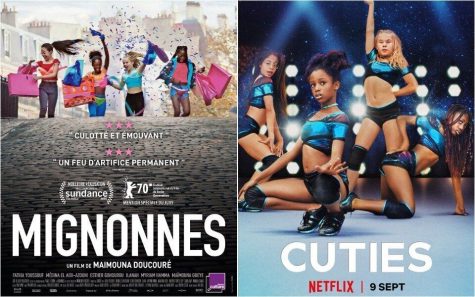The Numerous Mistakes and Severe Cancel Culture that Created “Cuties” Hatred
“Cuties” features many very intense and emotional scenes, and also many scenes that have young girls acting very sexual.
September 25, 2020
This year has come with many problems: a pandemic, wildfires, a controversial presidential election and more that have been flying around the internet for months. “Cuties” is no exception.
The hatred for “Cuties” (or as it was released in France originally, “Mignonnes”), has been far-reaching and nearly unanimous. Dislike for the movie started with its poster and advertising, where young girls pose sexually for the audience. However, while the poster was quite outrageous, not every claim made against the movie is true.
Let’s start with the few good points behind “Cuties,” before looking into why the flaws overpower the positives.
People have made assumptions that “Cuties” is about empowering little girls to act and dress provocatively, which is not true. “Cuties” exists to make the statement that nowadays girls are told being sexual is being independent, which is incorrect.
“I was at a neighborhood gathering in Paris,” says Maïmouna Doucouré, the director, in an interview by Zora. “A group of very young girls came on the stage to dance, and they were dancing in a very sexually revealing way. I decided to do research to see if they were aware and conscious of what they were doing.”
Doucouré isn’t wrong, most sexualization of girls comes now from mainstream media, often seen in dance contests and beauty pageants.
“Today’s sex-saturated culture prevents healthy psychological development among girls,” says AboutKidsHealth, a resource for the mental and physical health of children. “Cultural contributions to the sexualization of girls come from the media.”
To tell the truth, if the average person chose to watch the movie, they would most likely agree the message is about embracing femininity while learning to not become a prop. It’s about growing up in a world where women are inherently considered more sexual than men and are told to act attractively all the time, even at such young ages. It’s uncomfortable because the director is trying to make you feel how she felt when she was a child.
The movie should have been an admired film, and it would have been if it weren’t for a large amount of suggestive content the movie creates itself.
It’s reasonable to assume the makers of the movie didn’t intend to cause harm to children, but harm can come whether or not it is intended. Sexualization in the media, when pertaining to children, is different from violence in the media. When Steven Speilberg makes “Schindler’s List”, a movie about the Holocaust, featuring all the horrors inflicted upon Jewish prisoners, no one in the movie actually gets hurt. (Excluding the occasional paper cut possibly.) However, if “Schindler’s List” had been made by actually imprisoning and torturing millions of people, or even one, then the general public would be extremely angry.
Perhaps if this movie were a book instead, the general public reaction would not have been so bad. Same message, no outward foul. Instead, about 650 young girls auditioned for a role hoping to become movie stars, only to find the main focus of the film would be them dancing seductively on camera in front of an international audience.
Sexualizing exists when “sexuality is inappropriately imposed upon a person”, says AboutKidsHealth. Paying kids to pose the way these actresses do is definitely inappropriate. Children also don’t have the mental capacity to consent, meaning these actions can’t be considered non-imposed. It works the same way for many children abused by family members. Children often don’t have the ability to judge when someone is doing something inappropriate, meaning they’re willing to trust family members or employers more than they should.
Additionally, it’s worth mentioning that Netflix only made the situation worse. The ads in France were vastly different than those in America and were deeply reflective of how Netflix intended to use the movie as anger-inducing clickbait to get more money.
However, most of the fault falls on us, the internet. Again, most people haven’t watched the movie. Now, under the circumstances that people had heard of the movie, kept calm, looked into it, and then realized that giving it attention was only giving Netflix more money, this entire situation could have been much better. Corporations would be less likely to support controversial and harmful movies just for recognition.
“I’m hoping that these people will watch the movie now that it’s out,” says Doucouré to Zora. “I’m eager to see their reaction when they realize that we’re both on the same side of this fight against young children’s hypersexualization.”
The best recommendation I can give is to watch some clips or reviews of “Cuties” before deciding to watch. If it seems like something you’d want to give money to, then go ahead. If not, there’s no need to give it clout. This tradition we’ve created of giving the unworthy our constant attention will only dig us deeper into misunderstanding.
“It’s my sincerest hope that this conversation doesn’t become so difficult that it too gets caught up in today’s ‘cancel culture’,” said Doucouré in a self-written Washington Post article.








